Intel's Core i7 870 & i5 750, Lynnfield: Harder, Better, Faster Stronger
by Anand Lal Shimpi on September 8, 2009 12:00 AM EST- Posted in
- CPUs
Intel is on the verge of transitioning to 32nm. We'll see the first parts this year. What do you do with your 45nm fabs when you start moving volume away from them? Make really cheap quad-core Nehalems of course:
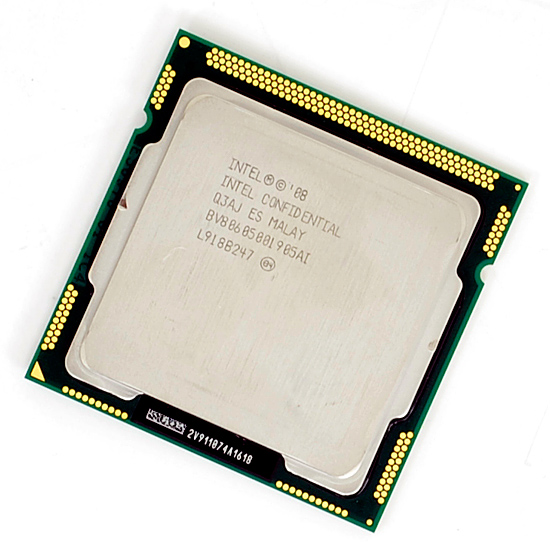
I'm talking $196. I'm talking faster than AMD's entire lineup. I'm talking about arguably the best processor of 2009. I'm talking about Lynnfield, and here's its backside:
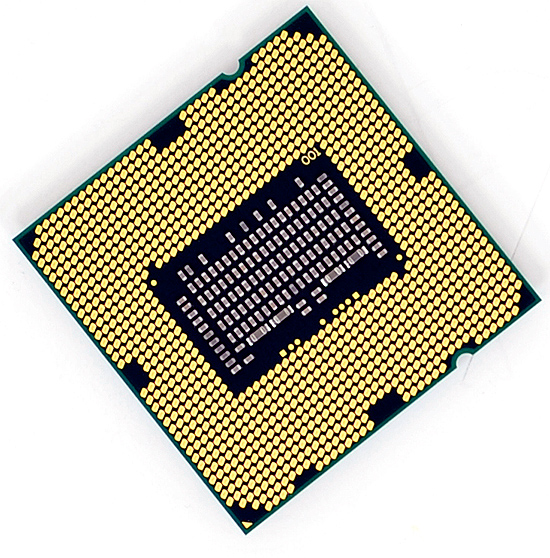
Mmm
I spent much of the past year harping on AMD selling Nehalem-sized Phenom IIs for less than Intel sold Nehalems. With Lynnfield, Intel actually made Nehalem even bigger all while driving prices down. Like I said, what do you do when you're still making boatloads of money in a recession and are about to start emptying your 45nm fabs?
I should clear things up before we progress much further. Lynnfield is the codename for mainstream 45nm quad-core Nehalem, while Bloomfield refers to the first Nehalem launched at the end of 2008:
| Processor | Manufacturing Process | Die Size | Transistor Count | Socket |
| Bloomfield | 45nm | 263 mm2 | 731M | LGA-1366 |
| Lynnfield | 45nm | 296 mm2 | 774M | LGA-1156 |
Despite being cheaper, Lynnfield is larger than Bloomfield. The larger die is due to one major addition: an on-die PCIe controller.
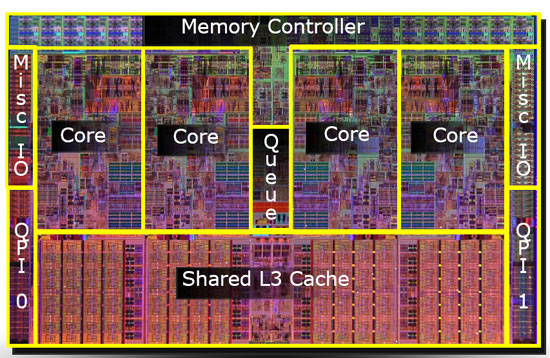
Bloomfield, The First Nehalem, circa 2008
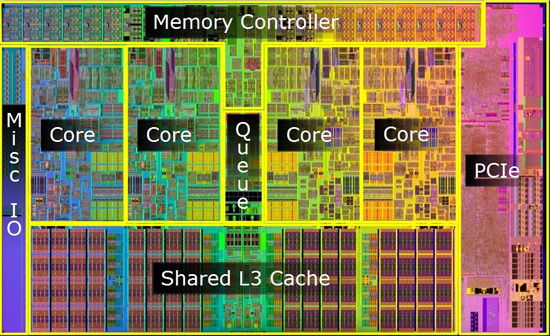
Lynnfield, Nehalem for All, circa 2009
The pink block to the right of the die is the PCIe controller, that's 16 PCIe 2.0 lanes coming right off the chip. Say hello to ultra low latency GPU communication. You'd think that Intel was about to enter the graphics market or something with a design like this.
Sacrifices were made to reduce CPU, socket and board complexity. Gone are the two QPI links that each provided 25.6GB/s of bandwidth to other CPUs or chips on the motherboard. We also lose one of the three 64-bit DDR3 memory channels, Lynnfield only has two like a normal processor (silly overachieving Bloomfield).
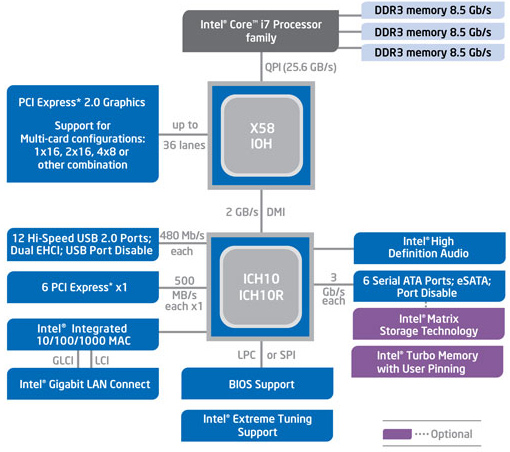
Intel's Bloomfield Platform (X58 + LGA-1366)
The sum is that Lynnfield is exclusively single-socket; there will be no LGA-1156 Skulltrail. While the dual-channel memory controller isn't really a limitation for quad-core parts, six and eight core designs may be better suited for LGA-1366.
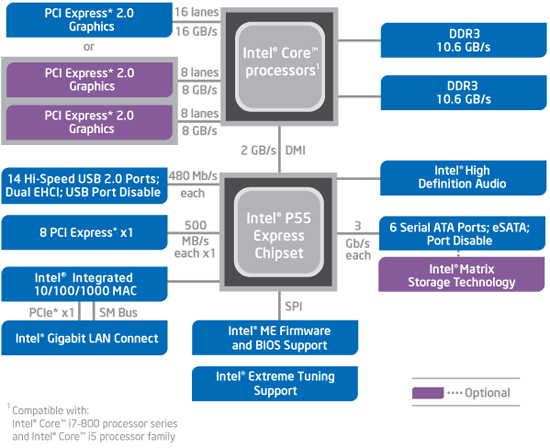
Intel's Lynnfield Platform (P55 + LGA-1156)
The loss of QPI means that Lynnfield doesn't have a super fast connection to the rest of the system, but with an on-die PCIe controller it doesn't matter: the GPU is fed right off the CPU.
The Lineup
We get three Lynnfield CPUs today: the Core i7 870, Core i7 860 and the Core i5 750. Intel's branding folks told us that the naming would make sense one we saw the rest of the "Core" parts introduced; yeah that was pretty much a lie. At least there aren't any overlapping part numbers (e.g. Core i5 860 and Core i7 860).
The i7 in this case denotes four cores + Hyper Threading, the i5 means four cores but no Hyper Threading. The rules get more complicated as you bring notebooks into the fray but let's momentarily bask in marginal simplicity.
| Processor | Clock Speed | Cores / Threads | Maximum Single Core Turbo Frequency | TDP | Price |
| Intel Core i7-975 Extreme | 3.33GHz | 4 / 8 | 3.60GHz | 130W | $999 |
| Intel Core i7 965 Extreme | 3.20GHz | 4 / 8 | 3.46GHz | 130W | $999 |
| Intel Core i7 940 | 2.93GHz | 4 / 8 | 3.20GHz | 130W | $562 |
| Intel Core i7 920 | 2.66GHz | 4 / 8 | 2.93GHz | 130W | $284 |
| Intel Core i7 870 | 2.93GHz | 4 / 8 | 3.60GHz | 95W | $562 |
| Intel Core i7 860 | 2.80GHz | 4 / 8 | 3.46GHz | 95W | $284 |
| Intel Core i5 750 | 2.66GHz | 4 / 4 | 3.20GHz | 95W | $196 |
Keeping Hyper Threading off of the Core i5 is purely done to limit performance. There aren't any yield reasons why HT couldn't be enabled.
Intel was very careful with both pricing and performance of its Lynnfield processors. I'm going to go ahead and say it right now, there's no need for any LGA-1366 processors slower than a Core i7 965:
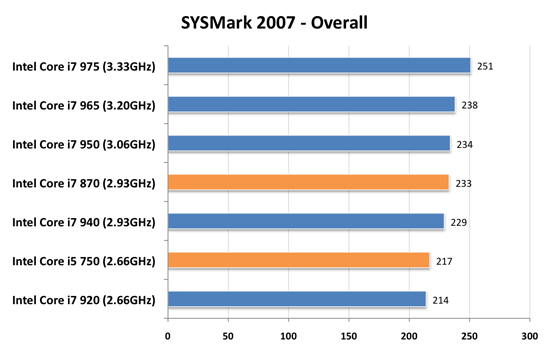
This is only one benchmark, but it's representative of what you're about to see. The Core i7 870 (LGA-1156) is as fast, if not faster, than every single LGA-1366 processor except for the ones that cost $999. Its pricing is competitive as well:
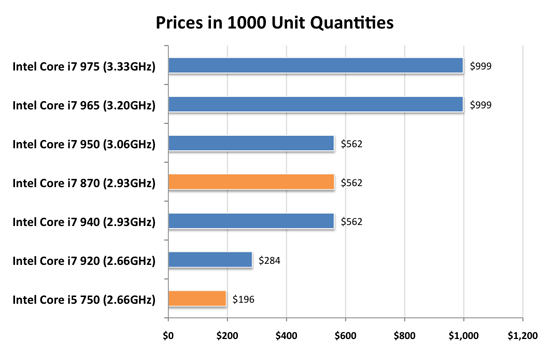
For $196 you're getting a processor that's faster than the Core i7 920. I'm not taking into account motherboard prices either, which are anywhere from $50 - $100 cheaper for LGA-1156 boards. I don't believe LGA-1366 is dead, but there's absolutely no reason to buy anything slower than a 965 if you're going that route.










343 Comments
View All Comments
JonnyDough - Tuesday, September 8, 2009 - link
Anyone who buys a $1000 CPU has more money than brains. If you wait six months you can buy a newer budget processor for about 1/15 of the cost, overclock it and obtain the same result. I would think that $925 would be more valuable to someone with sense than bragging rights for six months. I was taught that when people brag they are vain morons. A person's value should not be estimated by the stuff they have, but by the choices they make. We all get a lot in life, it's what you do with it that sets you apart. Unfortunately our society is ruled by greed and capitalism. I choose to speak against that. If you have a problem with that, I suggest you take it up with the greedy capitalist complaint department. They don't care either.max347 - Wednesday, September 9, 2009 - link
Hmm, it would seem to me that someone who has $1k to spend on a cpu probably has "alot of brains", hence the better-than-average financial position, enabling the purchase in the first place.Also, you equate greed to capitalism. This is clearly false. People get what they work for in a capitalist society. I am not saying it is perfect, though what would be a better alternative? People are not going to be financially equal, as some work harder than others. To dispute this would demonstrate a lack of experience...to say the least.
Someone chooses to get the best. It's their money, their choice. But you're right, you should probably call them a greedy capitalist.
fullcooler - Wednesday, September 9, 2009 - link
wow, you said that way calmer than I would have. very classy reply to a young leftist. perhaps when obama passes the "free $1000 cpu's for lazy punk leftists" plan, you and I can pay for his cpu,and he wont be a sellout to the man by working for it.imaheadcase - Tuesday, September 8, 2009 - link
I hate people who used that phrase "Has more money than brains". Doesn't it stand to reason, they have brains..if they have more money than you to buy the CPU... lolJNo - Tuesday, September 8, 2009 - link
Not necessarily - they might have inherited the money for example.Maybe you have more money than brains too...
JonnyDough - Tuesday, September 8, 2009 - link
Yep. These people sound like they have no idea how to be frugal with money. It's ok though, a fool and his money are soon parted.lyeoh - Thursday, September 10, 2009 - link
Stop doing that ok?If you discourage too many rich/stupid people from buying the bleeding edge stuff it just makes it harder for the rest of us.
Poor folks like me need those rich guys to rush out and buy the expensive CPUs (and GPUs etc) and work all the bugs out, get the production line ramped up etc.
Then 6-12 months later we have good and cheap stuff to buy.
The best CPU costs way less than an expensive house anyway, so it's not like he's going to cause some sort of nation wide or global financial crisis.
VaultDweller - Tuesday, September 8, 2009 - link
Maybe they don't know how to be frugal with money.Maybe they don't NEED to be frugal with money.
Sure, a fool and his money are soon parted - but so is a brilliant rich man who has more money than he needs.
niva - Tuesday, September 8, 2009 - link
I disagree with your first statement. There are people who simply want the best/fastest and will pay the money for it. Only in the last 3 or 4 years has top of the line performance become relevant only for gaming. A few years ago all sorts of pros needed the fastest they can get their hands on and purchases like $1k per CPU were actually justified.Now just because you can't afford a 1k CPU and never have been, doesn't mean people who buy such things are morons. Same goes for buying a Ferrari by the way. Quit being a jealous putz, thanks!
JonnyDough - Tuesday, September 8, 2009 - link
When you compare value ratios, yes. A $1000 CPU is soon worth about $75. A Ferrari sold as parts is worth about 1/15 of the price also. I didn't think I'd have to spell it out for you.